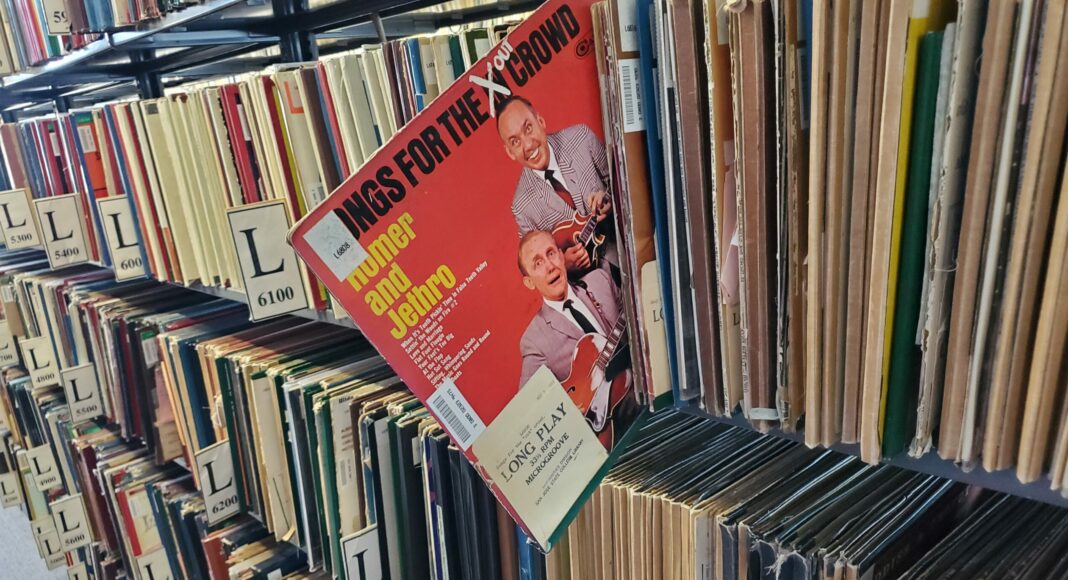A purple Ambrose Bierce lies flat atop a shelf of vinyl records on the fifth floor of the SJSU Library, so I pick him up.
I am looking at a spoken word LP of Bierce short stories, just one record among many available for anyone to check out from the library. Across 160 shelves of LPs, totaling 480 linear feet—approximately 18,000 vinyl records—this is the greatest record collection anywhere in the South Bay, yet no one ever looks at it. Not even the library employees, let alone the students, seem to realize how amazing this collection is. You’ll hear people say stuff like, “Oh yeah, I remember those from when I went to school there in the ’90s,” or, “Man, I haven’t looked at those in years,” or, “What? They’re still there?”
It’s true. Which was why I recently returned and pored through the collection. Ambrose Bierce was one of the most legendary sarcastic humorists of all time, so maybe it made sense that someone had recently pulled this record from the shelf and left it lying there for me to discover.
About half of the collection is classical music, but the remaining quagmire is the most obscure conglomeration of world music, spoken word, novelty tunes, blues, news, country, commercial advertisements, speeches and all sorts of decades-old detritus that no one would imagine still existed for the public to check out. But it’s all there. Many of the jackets were stuck together as I sifted through them, since no one had done so in years.
The LPs were formerly housed in the old Clark Library, a still-existent building across campus which predated the current MLK library. Before Clark, in the ’70s, the LPs were stored in the older Wahlquist Library, which still retained many of the older books after Clark was built. The Wahlquist building was then destroyed to build the MLK library in 2003.
Even today, the oldest LPs in this collection still have embossed plastic labels on the outside of the jacket designating the Library of Congress catalog number, labels someone typed with a vintage labelmaker decades ago. For example, the “Mexican Bird Songs” record was SL1593, while “Yodeling in the Tyrols” was SL1587.
As with any record collection, the sounds actually recorded onto the vinyl are only a part of the experience. You don’t even have to listen to any of it. Rifling through the shelves feels like an archaeological expedition. It’s so fun.
The Ambrose Bierce LP was one of those encased in a plastic cover, so it was in decent shape compared to the older stuff. It still had a pink “return to Clark Library” slip with a few date stamps from the last time anyone checked it out, the most recent of which was November 17, 1993. Before that, the next two dates were 1990 and 1985. The manila colored pouch containing the slip said: HUMANITIES DIVISION LIBRARY, CALIF. STATE UNIV. SAN JOSE, which indicated the record was even older than Clark Library. As with another few thousand LPs in the collection, it had made the journey from the Wahlquist building to Clark and then back across campus again to the MLK Main Library. Bierce himself would have been proud.
I could have spent an hour walking up and down the aisles, pulling random LPs from the shelves. Without even trying, I discovered Turkish Sufi music, Irish rebellion albums, electronic music from the University of Illinois, Michigan lumberjack songs, Charles De Gaulle speeches and square-dancing records. One shelf had a Pope Paul VI record right next to an LP of someone reading Nabokov’s Lolita. What a juxtaposition.
Anyone can get a public library card and then visit the front desk to have it enabled for SJSU materials. Then anyone can take the elevator to the fifth floor and check out the vinyl LPs. It’s that easy. Yet no one ever does this. Instead, this vast historical repository of ancient, archaic vinyl just sits there gathering dust.
So consider this a call to arms. Libraries are not just for books, local research, studying or uploading your résumé. You just might find that thrashed copy of Homer and Jethro tunes you’ve always wanted to sample.




What kind of library card is needed: San Jose, Santa Clara County, other?
Can they be checked out- like taken home? Not sure from the wording of the card gets you into the collection or allows items to be taken home.
Let’s make sure this valuable collection is not discarded. It could happen and the public might be unaware of decisions of the library administration.
Gary, did you know Paul K., the music librarian at SJSU?
You need a San Jose Library card, as the article says – a San Jose Public Library card can be enabled. You can check the materials out to take home.
Can you check these albums out to listen to at home?